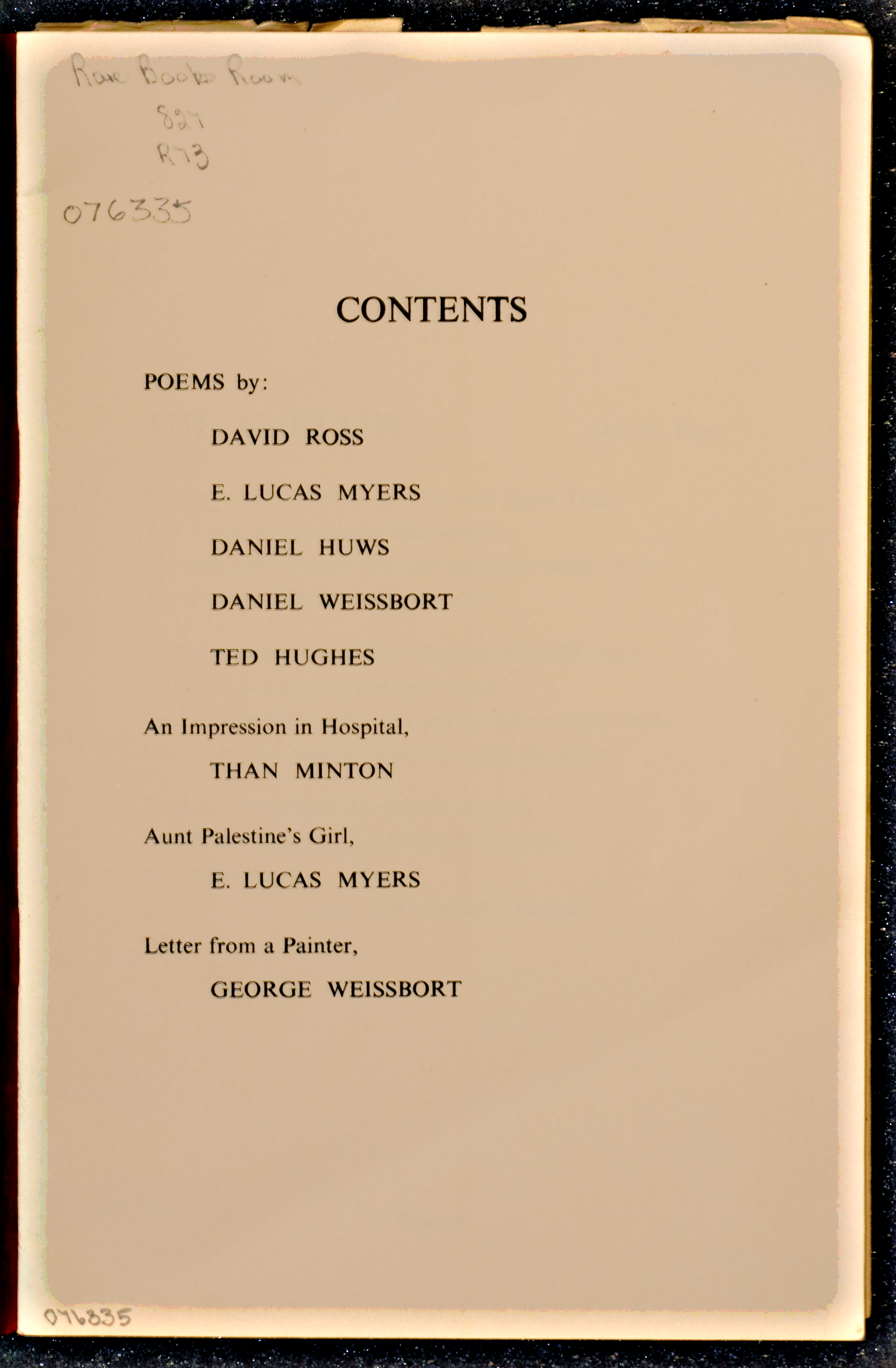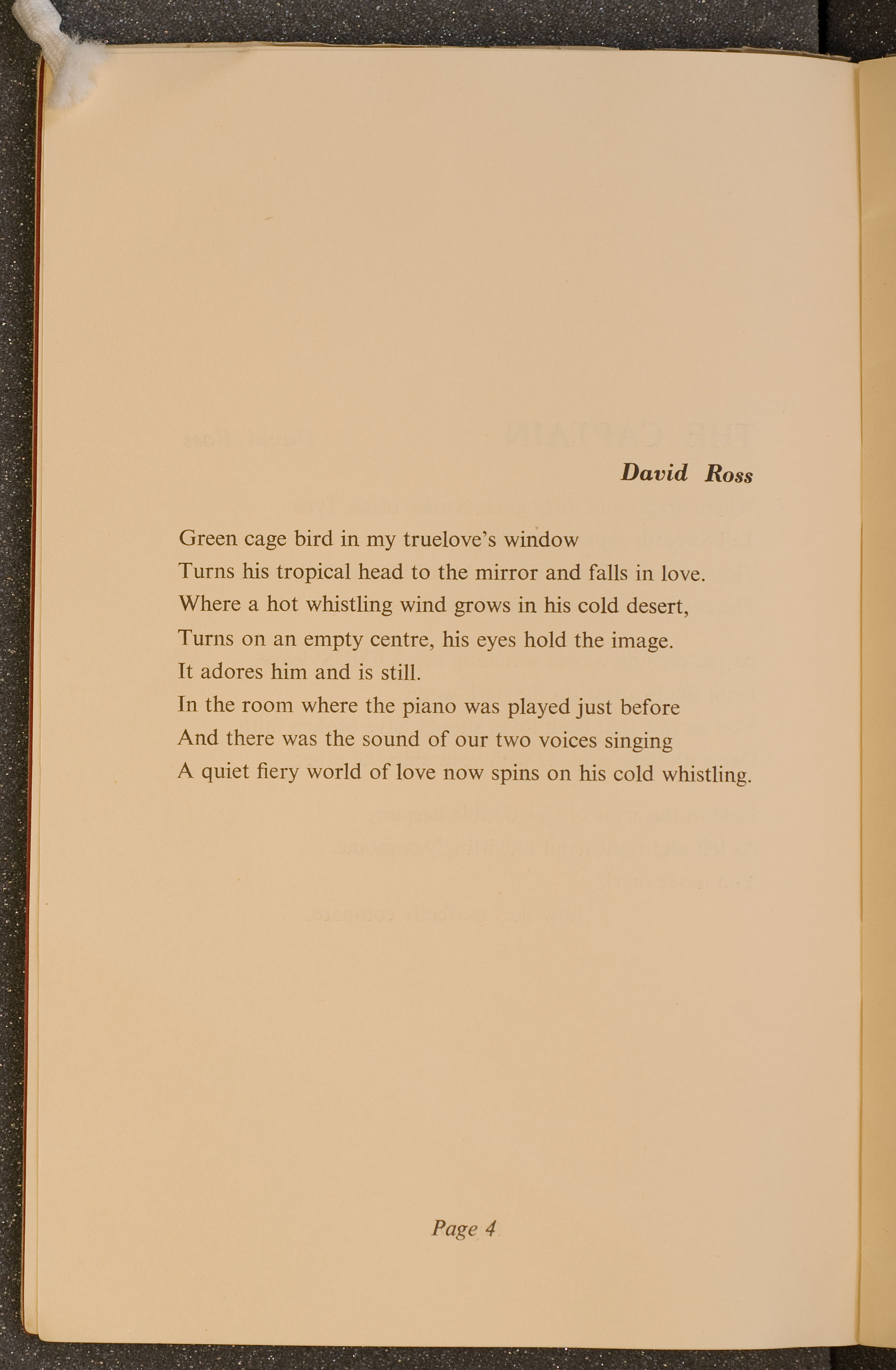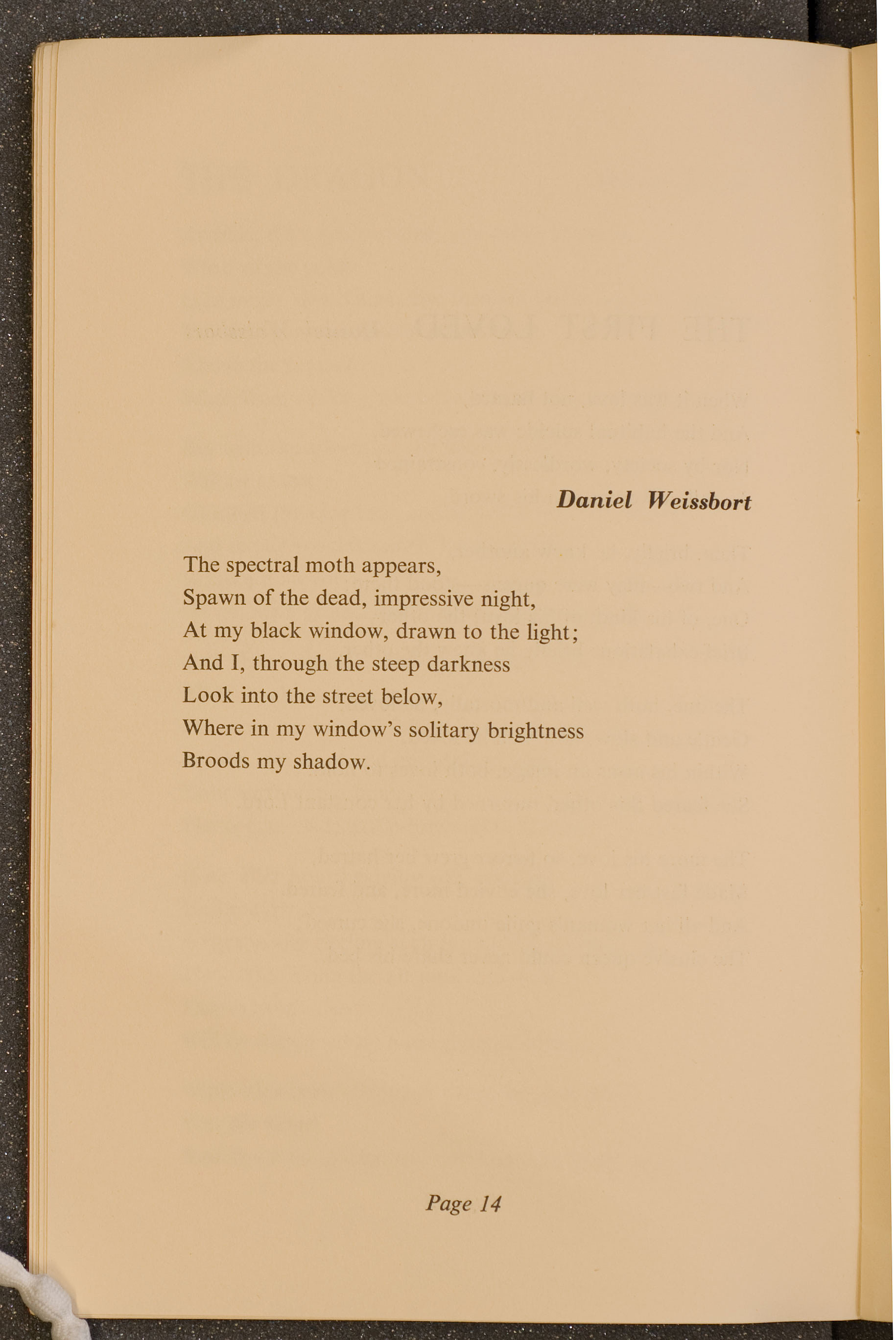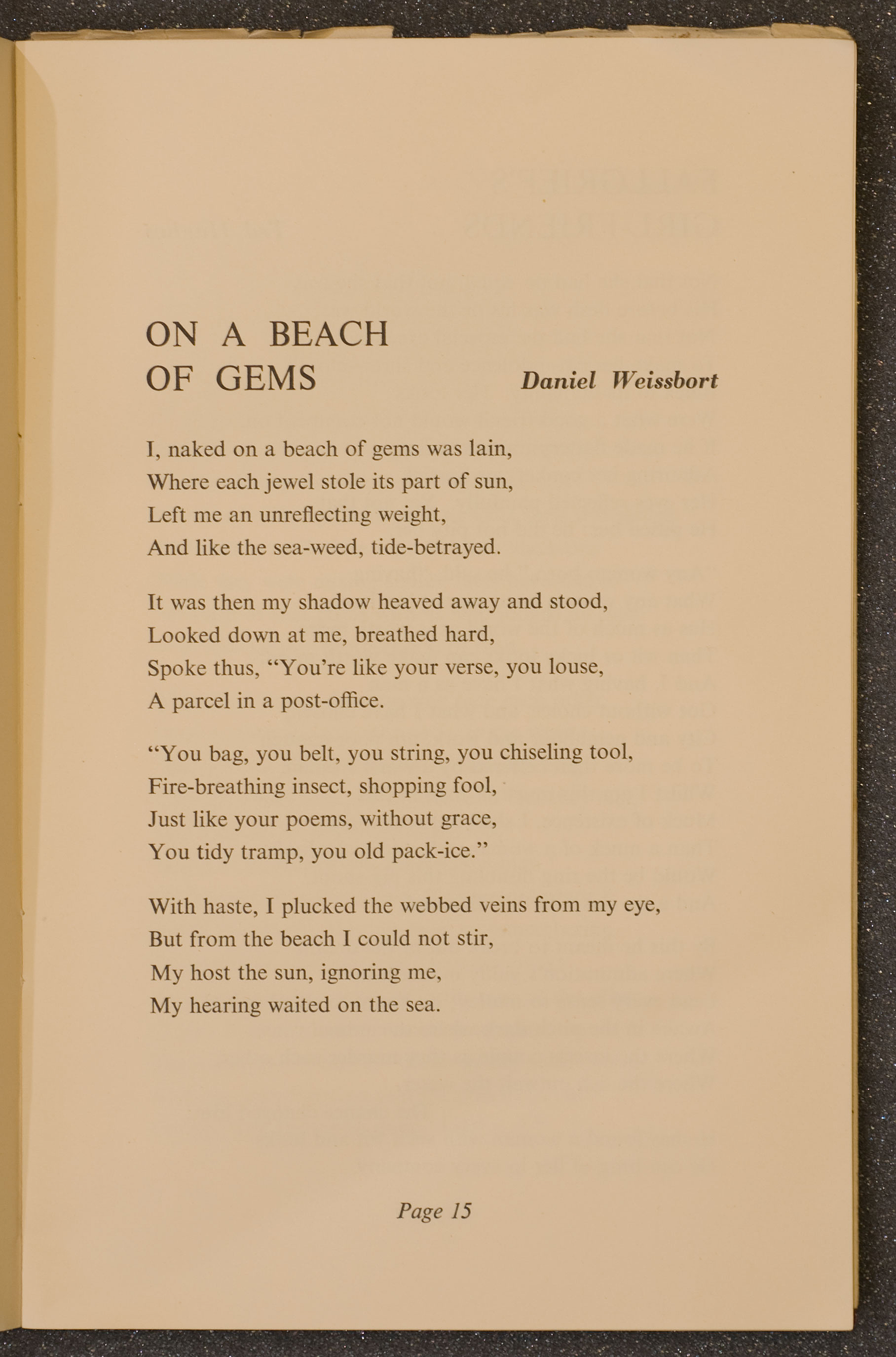In this essay undergraduate Yvonne Reddick looks at a developing interest in Hughes's poetry. She argues that he becomes increasingly interested in the natural world and the environment, both as an aspect of his mythology and as something under threat in reality.
In Hughes' poetry between 1957 and 1989, I think there is a gradual change from an anthropocentric, or human-centred viewpoint, towards a more biocentric, or ecological perspective. This progression in his poetry is more like the slow process of evolution than a sudden change from one mode of thinking to another. He may draw metaphors from the spiritual world of cultures, and yet in his collections The Hawk in the Rain through to Crow his is more a voice speaking of nature than a guardian spirit speaking out for it. Until Gaudete, his is not an environmentalist agenda, but a subtle exploration of the connection between man and nature. He tends also to be concerned with man and nature; in his earlier poetry, women are often reduced to sexual objects and producers of children. Yet in Gaudete, Hughes creates a collection sometimes akin to the views of , documenting the relationship between the female earth-goddess and a male worshipper; the difficulties of this relationship are explored in his later works.
Jonathan Bate is right to find in Hughes' poetry 'the hot stink of animal flesh' (as he says in The Song of the Earth, which is in 'Further Reading' below). His work, redolent of wildness, richly repays an ecocritical reading. According to Richard Kerridge, 'ecocriticism seeks to evaluate texts and ideas in terms of their coherence and usefulness as responses to environmental crisis' (as he says in Writing the Environment - see below). Like other schools of criticism ecocriticism reflects the political and cultural climate in which it is evolving. Recent interest in ecocriticism has grown out of the increasing inspiration artists, musicians and writers are taking in environmental issues; the 2007 Live Earth concert was a very high-profile manifestation of this interest.
However, Hughes died in 1998, before the publication of such seminal ecocritical works as Jonathan Bate's Song of the Earth. Yet even before the inception of ecocriticism proper, Ted Hughes' work anticipates this critical movement. To what extent are Ted Hughes' early works useful to 'environmental crisis'? He was certainly aware of ecological destruction. Greg Garrard (in his book Ecocriticism) states that modern environmentalism begins with 'A Fable for Tomorrow', in Rachel Carson's Silent Spring (1962). This book was very important in inspiring the ecological movement. Its title refers to the results of agricultural pesticides on the environment. Birds were dying at a frightening rate, and with them, their songs. Hughes' career as a published poet begins in 1957, and even before his encounter with Carson, his works show an inkling of literary green thinking. Hughes was an environmental writer ahead of his time, yet the brand of environmentalism in his poetry is subtly different from conventional ecological thinking, being at once more aesthetic and more mystical.
During his anthropological studies at Cambridge in 1953-4, Hughes gained an understanding of shamanism and the role of the shaman's animal Helper. As early as his residence in Pembroke College, Hughes created artworks inspired by animals: drawings of foxes and other creatures have been discovered on the walls of his old college room. Indeed, in his essay 'The Burnt Fox', Hughes recounts a dream he had while at university. This dream inspired him to change course from English to Anthropology. When exhausted by struggling to write a literature essay, he dreamt of 'a figure that was at the same time a skinny man and a fox walking erect on its hind legs' (in his book Winter Pollen, p. 9). The man-fox left a bloody paw-print on his essay, saying to Hughes, 'Stop this - you are destroying us'. His study of literature was destroying the creatures inhabiting his poetic imagination. Hughes also relates to the critic Keith Sagar that he dreamed of 'a leopard - but standing erect' (in his Letters, p. 422) the following night. The burnt fox inspired his poem 'The Thought-Fox', which 'enters the dark hole of the head' (line 22) and thanks to whom 'The page is printed' (line 24). The result is not an essay but a poem like an encounter between the modern-day shaman and his 'animal Helper'. 'A widening deepening greenness' (line 18) begins when the poet looks into the fox's eye, but it is not yet the greenness of deep ecology. The half-human fox returns to Hughes' mind to inspire poetry, rather than speaking through him.
The macaw, the jaguar, the sculptural horses, the man-leopard and the were-fox of Hughes' first collection still struggle to escape . Alone of all the creatures in The Hawk in the Rain, the thought-fox has sufficient agency to give orders to the poet. Instead of a formal essay or an imitative poem, it demands the poetic equivalent of a bloody paw-print: a sacrificial poem that goes beyond conventional language to create something natural. The dream of 1953 is a modern-day encounter with an animal helper: Hughes' eco-shaman was initiated long before he read Silent Spring. The 'greenness' glimpsed in the fox's eye continues to widen and deepen in later works. It can even be evident in his poetic form - Hughes breaks away from the canonical four-line stanza towards a more fluid, natural form.
Modern biocentric ideas are akin in part to the ancient, animist beliefs that Hughes studied. According to Terry Gifford and Neil Roberts, he most consistently draws on Robert Graves' The White Goddess for ideas about the earth-goddess and her related aspects:
[Graves describes] the nature-goddess in her three aspects of maiden, mother and crone ( in the best-known version). This myth holds, in a single imaginative unit, the total, inescapable character of reality, both beneficent and destructive. It assists Hughes [...] to incorporate all that is terrifying and predatory, as well as comforting and nurturing, in nature. The goddess is implicit in his work from the beginning, but becomes increasingly prominent in the 'mother' of several of the Crow poems, and in the object of Lumb's devotion in Gaudete. (Quoted from Gifford and Roberts, p. 19)
As Hughes' work matures, the feminine figure becomes more and more clearly identified with nature. From the human dilemmas of 'Hag' in The Hawk in the Rain, the hag-figure evolves into a character empowered in Lupercal's 'Witches' because her affinity with nature subverts patriarchy. She is at once the maidenly yet sexualised 'rosebud' and the animal 'old bitch' (line 4) who could 'ride a weed the ragwort road' (line 2). In Wodwo, the human protagonist of 'Wino' describes himself as part-plant: 'Grape is my mulatto mother' (line 1). However, he desires the grape to fulfil his needs rather than to be his equal: 'Her veined interior / Hangs hot open for me to re-enter' (lines 2-3).
In Gaudete, however, a significant change in the presentation of the nature-goddess takes place. She is presented as not only equal to, but a superior of, the poet; he, her priest, is also a part of her. Her potency is conveyed in the power of the surging rhythms used by Hughes:
She rides the earth
On an ass, on a lion.
She rides the heavens
On a great white bull (lines1-4)
This canto is given a timeless, chant-like quality by Hughes' use of the present tense and repetitive, echoing constructions. A rising stress-pattern emerges in the two of the first line and the rising feet of even numbered lines. Yet this stanza is far from regular in metre, though it is carefully cadenced. In Hughes' essay 'Myths, Metres, Rhythms' (part of the collection Winter Pollen) he cites Gerard Manley Hopkins' description of as 'the most natural of things' (p. 333). For Hughes, too, this verse-form is the most natural of things. A sinuous, organic power, which refuses to be reined in by regular metre, emerges in the stress-patterns of these lines.
'Great white bull', a threefold strong stress, resists the two-stress pattern of the three previous lines, ending the stanza on an upsurge of sound-energy. This is of the ceaseless, vigorous movement of the goddess, who refuses to be constrained by Man. Hughes sets out (in the same essay in Winter Pollen) a mythology of poetics. He personifies regular metre and 'sprung rhythm' as a conflicting couple locked in an uneasy marriage. The latter, the more 'unorthodox tradition,' as Hughes calls it, is seen as feminine. Her struggle to resist the male gives her a wild power, as 'she erupts, love-mad, imperious, dazzling, tempestuous, alarming, while he fights to subdue her, in Marlowe and early Shakespeare' (p. 369). Her dazzling, tempestuous, awe-inspiring rhythmic energy is also unleashed in Hughes' poetry. The 'unorthodox tradition' is the very voice of the earth-goddess. Hughes reworks traditional metre to take poetry beyond the constraints of anthropocentric language and thought.
Yet poetry was not the only medium through which Hughes' concern with breaking anthropocentric constraints was given voice. In 1987, he wrote to Mark Purdey that a letter he had written to The Times about man-made chemicals affecting otters had been turned down by the editor (Letters, p. 534). While Hughes certainly was 'a fearless environmental activist' as Douglas suggests (in the online article cited below), his poetry expresses the concern that such activism may come too late to prevent extinction. The collection Wolfwatching (1989) contains what is perhaps Hughes' most environmentalist poem: 'The Black Rhino'. It is also one of his bleakest visions of death in the natural world. Like the tainted river, the rhino is 'Horribly sick, without knowing,' (III, line 2) and yet her sickness is of a different order. 'She is infected / With the delusions of man' (lines 3-4) and has 'blundered somehow into man's phantasmagoria, and cannot get out' (lines 7-8).
Here, Hughes refines his depiction of animal mythologies. The very nature- that gives rise to the relationship between the shaman and his power-animal also attributes magical properties to the rhino's horn. This makes it a commodity of commercial value, 'at eight or nine/ thousand dollars a handful' (lines 28-9):
The Black Rhino
Is vanishing
Into a soft
Human laugh (lines 53-6)
The final line is not end-stopped, but fades with the sound of human derision. One is left with the impression of the human voice replacing the organic discourse of the mute 'thorny scrub', the silent 'waterholes' and 'horizon mountain-folds' (lines 51-2). If Gaudete represents the echoing, repeating, cyclical hymns of the natural world, in Wolfwatching we see how a cycle of natural echoes can be broken and silenced by human intervention. Hughes' later poetry is tinged with a melancholic sense that despite his activism, it may be too late to save some species.
Works Cited
- Ted Hughes, Collected Poems, ed. Paul Keegan (London, 2003).
- Ted Hughes, Letters of Ted Hughes, ed. Christopher Reid (London, 2007).
- Ted Hughes, Winter Pollen: Occasional Prose, ed. William Scammell (London, 1994).
- Jonathan Bate, The Song of the Earth (Harvard, 2002).
- Lawrence Buell, The Future of Environmental Criticism (Oxford, 2005).
- Ed Douglas, 'Portrait of a Poet as Eco-Warrior,' accessed at http://books.guardian.co.uk/poetry/features/0,,2204850,00.html on16/02/08.
- Greg Garrard, Ecocriticism, (Abingdon, 2004).
- Terry Gifford and Neil Roberts, Ted Hughes: A Critical Study (London, 1981).
Further Reading
Ecocriticism: Greg Garrard, Ecocriticism (Abingdon, 1994) is a good introduction to this emerging field. Jonathan Bate, The Song of the Earth (Harvard, 2002) is one of the key examples of the theory in practice. Rachel Carson's Silent Spring (first published in 1962 but reprinted since then) was a founding text of the environmental movement.
Ted Hughes, Shakespeare and the Goddess of Complete Being (London, 1993). Hughes himself interpreted literature in relation to the mother-goddess myth. His reading of Shakespeare is idiosyncratic but makes an interesting comparison with his poems.
Thomas Nagel, 'What is it like to be a bat?', Philosophical Review, 83 (1974), 428-439; but it can be found online in various places. In the light of the mention of anthropomorphism above, it might be interesting to chase up this classic essay about the differences between species and their consciousnesses and experiences. It is not a simple read, but it is rewarding.
Further Thinking
Yvonne Reddick suggests that 'more fluid' forms of Hughes' later poetry are more 'natural'. Do you think that less strict verse forms have a more 'natural' effect in his work? Do you think this is generally true?
Do you think that 'ecocriticism' (which 'seeks to evaluate texts and ideas in terms of their coherence and usefulness as responses to environmental crisis' as is quoted above) seems like a good way to go? Why should literature have something to say about the environment?
Shamanism is a system of belief based on communication with a spirit world, through the work of a holy person or 'shaman'
Eco-feminists combine the interests of ecology and feminism, and argue that the two have a lot of affinity. Both women, and the environment, suffer oppression by men.
The tendency to portray animals with human characteristics. This might not seem properly ecological, since animals ought to be respected as animals.
Three Greek goddesses. Some people who study myths from an anthropological perspective see them as three aspects of am earth-goddess figure found in many mythologies.
An iamb is a unit of metre composed of an unstressed syllable followed by a stressed syllable - iambic metre (ti-TUM ti-TUM etc.) is made up of iambs.
An anapeast is a unit of metre composed of two unstressed syllables followed by a stressed syllable, ti-ti-TUM.
A kind of poetic metre associated particularly with the Victorian poet Gerard Manley Hopkins. He believed it followed the rhythms of speech. Lines are divided into 'feet' in which the first syllable is stressed, and any number of unstressed syllables can follow.
This word derives from 'mimesis' which means 'imitation' or 'representation'; so 'mimetic of' means 'imitating' and/or 'representative of'.
A state where the difference between real and unreal (whether dreamed, or imaginary) is blurred





